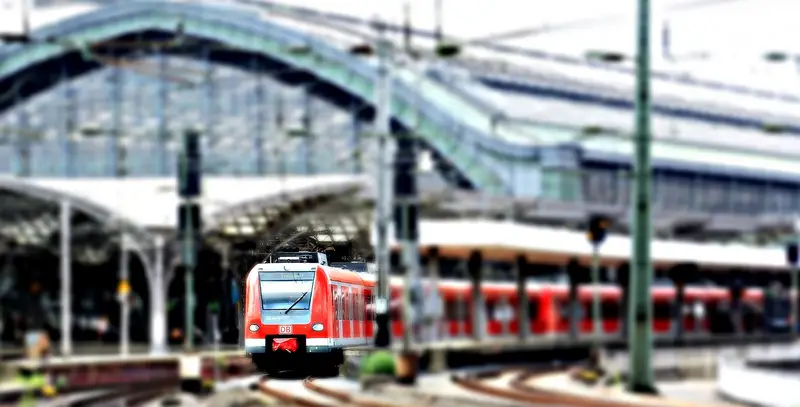
Just when you’ve found the perfect house to buy, you realise it’s near a train station. But the question is; should you buy this house or should you give it a miss? Should you live near a train station?
There are a number of factors to consider when buying a house near to a train station, which include noise, commuter convenience, how easy or difficult it will be to sell the house in the future, what you can afford and what effect this will have on future house price increases.
It is for these reasons why you need to consider carefully whether you should buy a house near a train station.
You should only buy a house near a train station once you have spent time listening to how noisy the trains are inside the house and in the garden. But you must consider future saleability of the house, as others will not like the sound of noisy trains on nearby train tracks.
Before you leave, you may also like to discover how you could save you up to £71,475 when you buy your next house if it would originally cost £350,000. Alternatively, if you propose to buy your next house for £250,000, the saving could be up to £51,852 instead.
To find out more, plus to get hold of my free mortgage savings calculator tool, please take a look at my video course about how to sell your house in under 2 weeks for more money.
Does living near a train station add value?
Living near a train station can add up to 9.7% to the value of a house, but the value added will depend on how close the house is the the train station, and on how close it is to the train tracks. If a house is too close to train tracks and train noise, this may have the opposite effect and decrease its value.
For example:
- Houses near tube stations in London grow by 2.1% more per year than the local authority average.
- According to the Nationwide houses within 500 metres from the nearest train station in London are £46,800 more valuable when compared to similar properties 1,500 (1.5km) away. This compares to a house premium of £11,400 in Glasgow and £11,000 in Manchester.
- According to the Nationwide houses in London sell for a 9.7% premium.
“London sees biggest house price premium as households still attach significant value to transport links despite the pandemic.”
Nationwide House Price Index – Report June 2021
Is it bad to live near train station?
Living near a train station can be bad for your health, as there’s an increased risk of children developing asthma and nearby residents have a higher cancer risk from diesel pollution. The risk to your health will be affected by the house’s proximity to the train tracks, volume of trains and the number of trains that run on diesel.
You should take time to read this article about buying a house next to a railway line and train tracks. There’s a very useful section on noise from trains and decibel levels, which may help you in your decision.
There’s also a handy table giving distances from train lines and house noise travels. There is also a handy table that compares decibel noise levels, which you may find helpful too.
What are the pros and cons of living near a train station?
As with anything, there are always pros and cons to consider. As far as buying a house near a train station the pros and cons include.
What are the pros of buying a house near a train station?
- If you use the train to get to work, living near to the train station is a benefit.
- If the house suffers from train noise due to the proximity to the train tracks, you will get a bigger house for your money.
- If you don’t like things too quiet, living near a train station will make it more interesting.
- House near train stations benefit from stronger price growth when they are not affect by train noise.
- The house will be easier to sell if its not affected by train noise.
- Houses affected by train noise are more affordable for first time buyers.
What are the cons of buying a house near a train station?
- Living near a train station can be noisy if the trains run behind the house.
- Trains on nearby tracks can cause vibrations, especially freight trains ad fast trains.
- Houses near train stations can be more expensive than houses further away.
- Trains start early in the morning, so if the house backs onto train tracks or is very close to the station, this could mean an early morning start to noisy trains and a noisy Tannoy system.
- The house will probably take longer to sell if it is affected by train and Tannoy noise.
- The garden will be noisy when trains pass if the house is next to train tracks.
- If you are an early to bed person and a light sleeper, you won’t like the noise of trains.
- In the summer the house will be noisier with the windows open.
- Be aware that ‘ghost trains‘ can run through the night to de-ice the tracks.
- Even though the train station will be closed at night, overnight maintenance can be noisy if you live near train tracks too.
- If there’s no parking permits or parking payment system on your road, people will park there to avoid paying station car parking fees.
- If the train line is on a corner you may get wheel-squeal as the trains grind around the corners.
Can you get a mortgage on a house near a train station?
You will be able to get a mortgage on a house near a train station, but be aware that the valuation will reflect how close the house is to train tracks and noise.
Will you regret buying a house near a train station?
To avoid having regret buying a house near a train station, make sure you visit the house at different times of the day to see how noisy it will be. Ask the sellers if you can open the windows to see how noisy it is when a train goes by.
If you are a light sleeper, you may find that if the house is also near train tracks, buying it may not a good idea, and may be a decision you would regret.
Final thoughts on buying a house near a train station
After you’ve weighed up the pros and cons of buying a house near a train station, and so long as you’ve done your homework and visited the house more than once, the positive things about buying a house near a train station is you’ll be getting the place cheaper and if you commute, your walk to the station will be quick.
Be careful about listening to what the estate agent tells you about buying a house near a train station, as an estate agent works for the seller.
Anything the estate agent tells you will be biased and should be taken with a pinch of salt, as they are only interested in their commission. Always do your own research on house prices in the area before you buy.
But in the end, at some point in the future you may wish to sell the house again and its proximity to a train station may affect its value and how long it takes to sell.
An important read before you go
Finally, you may also like to discover how you could save you up to £71,475 when you buy your next house if it would originally cost £350,000. Alternatively, if you propose to buy your next house for £250,000, the saving could be up to £51,852 instead.
To find out more, plus to get hold of my free mortgage savings calculator tool, please take a look at my video course about how to sell your house in under 2 weeks for more money.
I hope you’ve enjoyed this article about buying a house near train station
If you’ve enjoyed this article about “buying a house near train station” please share it on your favourite social media site.
Also, if you have any questions, please feel free to comment below too. Please also share any of your experiences with properties you’ve bought. Alternatively, if you need more help, please feel free to contact us on our contact us page here. Or join the discussion and ask your question in the property forum.




